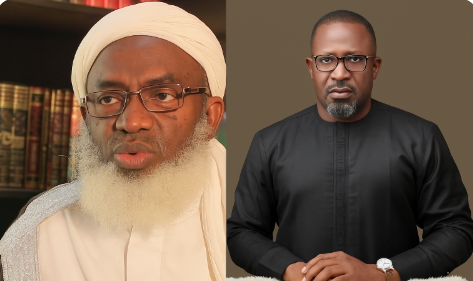Listen to the article
Nigerian Political Figure Condemns Cleric’s Revisionist Civil War Claims
Denge Josef Onoh has strongly rebuked Islamic cleric Sheikh Ahmad Gumi for what he termed “historical lies” regarding the late Biafran leader General Chukwuemeka Odumegwu-Ojukwu’s characterization of the Nigerian Civil War.
The controversy arose after Gumi, in a recent interview responding to U.S. President Donald Trump’s threat of potential military intervention over alleged Christian persecution in Nigeria, claimed that Ojukwu had falsely portrayed the 1967-1970 conflict as genocide against Christians. According to Gumi, such allegations were undermined by the fact that General Yakubu Gowon, Nigeria’s head of state during the war, and his deputy were Christians.
Onoh dismissed Gumi’s statements as “factually bankrupt” and a “deliberate attempt to rewrite the blood-soaked pages of Nigeria’s Civil War for petty and divisive ends.”
“This is not scholarship; it is sophistry, a cheap sleight of hand meant to gaslight survivors and sanitize atrocities under the guise of peace and stability,” Onoh stated in his detailed response.
In his rebuttal, Onoh referenced documented historical evidence of the 1966 pogroms that preceded the civil war, during which an estimated 30,000 Igbos were killed in targeted ethnic and religious violence across northern Nigeria. He cited eyewitness accounts, reports from international organizations like the International Committee of the Red Cross, and diplomatic records confirming the systematic nature of the attacks.
Onoh further referenced Ojukwu’s contemporaneous documentation of these events in his “Statement on the Nigerian Crisis” (September 1966) and the “Ashram Declaration” (May 1969), which detailed the suffering of Biafrans during the conflict. He noted that the resulting war and blockade led to a famine that claimed approximately two million lives, mostly children.
The political figure characterized Gumi’s emphasis on Gowon’s Christian faith as a “risible deflection” that ignores the complex religious and ethnic dynamics within the Nigerian military at that time, particularly the influence of northern Muslim officers in directing operations against Biafra.
Beyond the historical debate, Onoh broadened his criticism to encompass Gumi’s more recent activities, particularly his controversial role as a self-appointed mediator with bandit groups in northern Nigeria. He accused the cleric of effectively legitimizing criminal organizations through his advocacy for amnesty and engagement, citing statistics showing escalated kidnappings from 3,620 in 2020 to over 5,000 by mid-2025, with ransoms exceeding ₦2.57 billion.
Onoh also criticized Gumi’s tendency to frame Nigeria’s security challenges through conspiracy theories, including claims about “white evangelical Christian supremacists” and dismissals of Boko Haram as a “CIA creation.” He pointed to Gumi’s recent suggestion that President Tinubu should negotiate with terrorists in the manner of Israel-Hamas truces.
In his conclusion, Onoh called for an end to divisive historical revisionism and urged Nigerians to pursue unity based on equity rather than ethnic or religious identities, aligning with President Tinubu’s “Renewed Hope” agenda.
The exchange highlights ongoing tensions in Nigerian political discourse around historical memory, religious dynamics, and approaches to contemporary security challenges, particularly in the context of external interest in Nigeria’s internal affairs.
Fact Checker
Verify the accuracy of this article using The Disinformation Commission analysis and real-time sources.




13 Comments
This is a complex and sensitive topic, and it’s concerning to see political figures seemingly trying to downplay or deny the scale of atrocities that occurred. Careful, evidence-based examination of the historical record is essential to understanding this tragic period.
I agree, it’s troubling to see attempts to rewrite or whitewash the history of the Nigerian Civil War. Maintaining an objective, fact-based perspective is crucial, even when it challenges certain political narratives.
This debate highlights the ongoing challenges in reconciling conflicting historical accounts and interpretations of the Nigerian Civil War. While political figures may have competing agendas, it’s essential that we strive for a nuanced, fact-based understanding of this painful chapter.
You raise a fair point. Maintaining objectivity and respecting the experiences of those affected should be the priority, rather than attempting to score political points or rewrite the past to fit certain narratives.
The debate over Ojukwu’s characterization of the Nigerian Civil War as a ‘genocide’ highlights the enduring controversies and sensitivities surrounding this period. While perspectives may differ, it’s important that we engage with the historical record in a nuanced and balanced manner.
This discussion underscores the need for rigorous, impartial historical analysis of the Nigerian Civil War. Dismissing Ojukwu’s warnings as ‘propaganda’ seems dangerously simplistic, and we must be wary of any attempts to rewrite or downplay the atrocities that occurred.
Well said. Maintaining objectivity and respecting the experiences of those affected should be the primary concerns, rather than allowing political agendas to distort the historical record.
This debate over the historical interpretation of the Nigerian Civil War is a complex and sensitive issue. It’s concerning to see attempts to downplay or deny the scale of atrocities that occurred, and it’s essential that we engage with the full historical record in a balanced and evidence-based manner.
I agree completely. Maintaining objectivity and respecting the experiences of those affected should be the top priorities, rather than allowing political agendas to distort the historical narrative.
This is a complex and contentious issue regarding the Nigerian Civil War. While there may be differing historical perspectives, it’s important to carefully examine the evidence and avoid rewriting or whitewashing the atrocities that occurred. Dismissing Ojukwu’s warnings as mere ‘propaganda’ seems shortsighted.
I agree, it’s critical to engage with this history objectively and avoid revisionist narratives. The survivors and victims deserve to have their experiences acknowledged, not denied or minimized.
The conflicting narratives surrounding Ojukwu’s characterization of the Nigerian Civil War highlight the ongoing challenges in reconciling different historical perspectives. While there may be valid disagreements, it’s critical that we approach this topic with nuance, empathy, and a commitment to the truth.
The accusations of ‘historical lies’ and ‘deliberate attempts to rewrite’ the history of the Nigerian Civil War are certainly serious. This underscores the need for rigorous, impartial historical analysis to establish the facts and ensure that the full truth is brought to light.